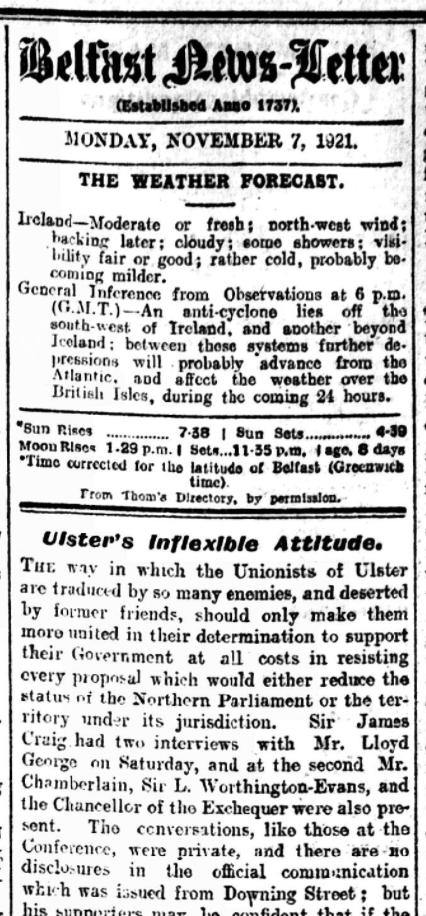Craig meets with Lloyd George
07 November 1921

Belfast News-Letter, 7 November 1921
James Craig and senior unionists were consulted on aspects of the ongoing treaty negotiations in London. Still, no senior Northern Ireland politicians took a direct part in the talks between the members of Dáil Éireann and the British government. Craig met with British government representatives on several occasions, but as can be seen from this editorial from the Belfast News-Letter in early November, he often made little headway. The editorial is also interesting for discussing alternative proposed arrangements for the partition of Ireland, with the potential ceding of Fermanagh and Tyrone to the new Irish state considered a likely prelude to total unification.
Ulster's Inflexible Attitude.
The way in which the Unionists of Ulster are traduced by so many enemies, and deserted by former friends, should only make them more united in their determination to support their Government at all costs in resisting every proposal which would either reduce the status of the Northern Parliament or the territory under its jurisdiction. Sir James Craig had two interviews with Mr. Lloyd George on Saturday, and at the second Mr. Chamberlain, Sir L. Worthington-Evans, and the Chancellor of the Exchequer were also present. The conversations, like those at the Conference, were private, and there are no disclosures in the official communication which has issued from Downing Street; but his supporters may be confident that if the proposals which have appeared in the London newspapers were put before him his replies were entirely consistent with his public speeches.
Restricted Conversations
He is not a statesman who would speak with one voice in Downing Street and another in the Northern Parliament. After his first interview he stated that he had arranged that when Ulster 's interests are reached in the Conference all its representatives will be asked to attend, and in the meantime nothing is to be settled behind their backs. Upon this statement Desmond Fitzgerald, the rebel publicity agent, remarks that "the Conference is, of course, confined to the accredited representatives of the British and Irish nations." This is a re-assertion of the impudent pretence of the Sinn Fein delegates that they have the right to speak for the whole of Ireland, and that the Unionists of Ulster are citizens of the "Irish Republic," and bound to acknowledge allegiance to it, instead of to the King and the Imperial Parliament. They restrict the conversations between Mr. Lloyd Gorge and the Ulster representatives to the best means of getting rid of what they call the Partition Act, or in other words, the best means of abrogating the Parliament and Government of Northern Ireland. But conversations on this subject could not occupy many minutes. It would be only necessary to remind Mr. Lloyd George of his statement that they cannot be abrogated without their own consent, and to inform him that in no circumstances will their consent be given.
Media Frenzies
There has been a great deal of writing in the London and some of the provincial newspapers about the importance which is attached in the Conference to the Counties of Tyrone and Fermanagh, and it has been represented that If they were transferred, or parts of them, from Northern to Southern Ireland, it would be easy to effect a settlement. But this is only an example of the tactics of the rebels. As one of their friends in the Press admits, they are not fighting for two counties but for six, and they are only using the threat that Ulster may be deprived of these two counties in order to compel it to surrender on the main question of the unity of Ireland. Their tactics will not succeed, for Ulster will not yield on either their minor or their major demand.














